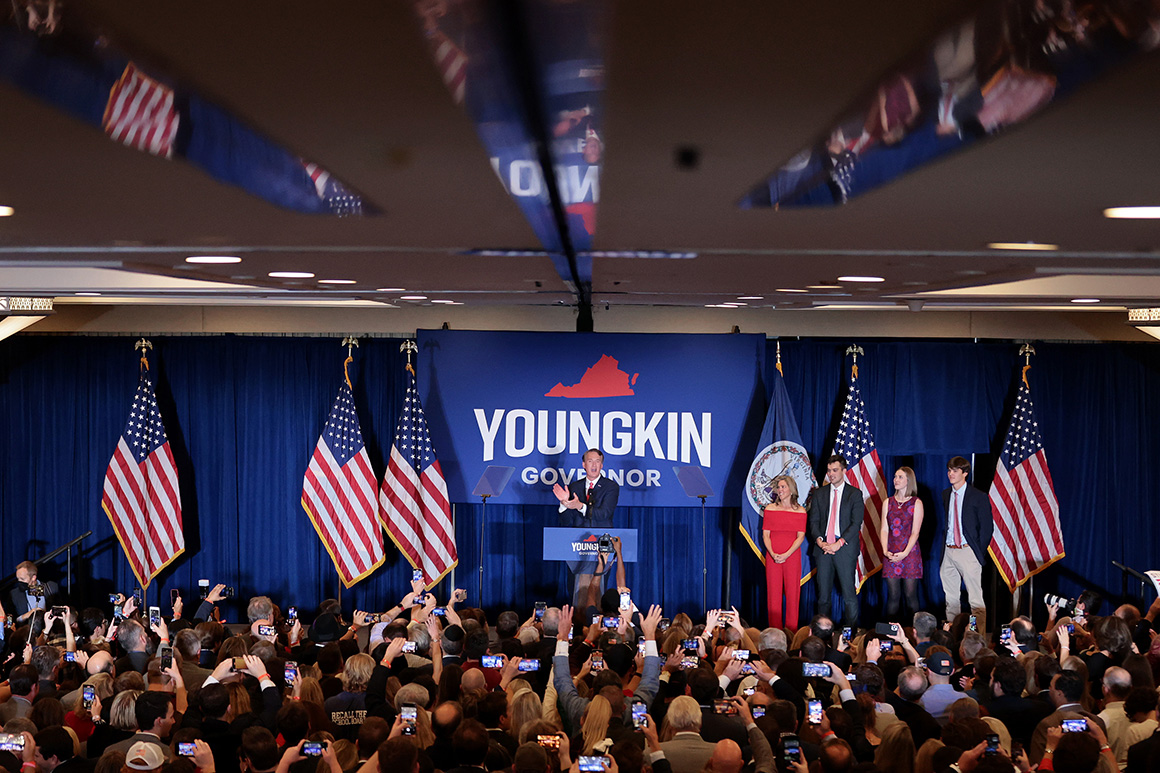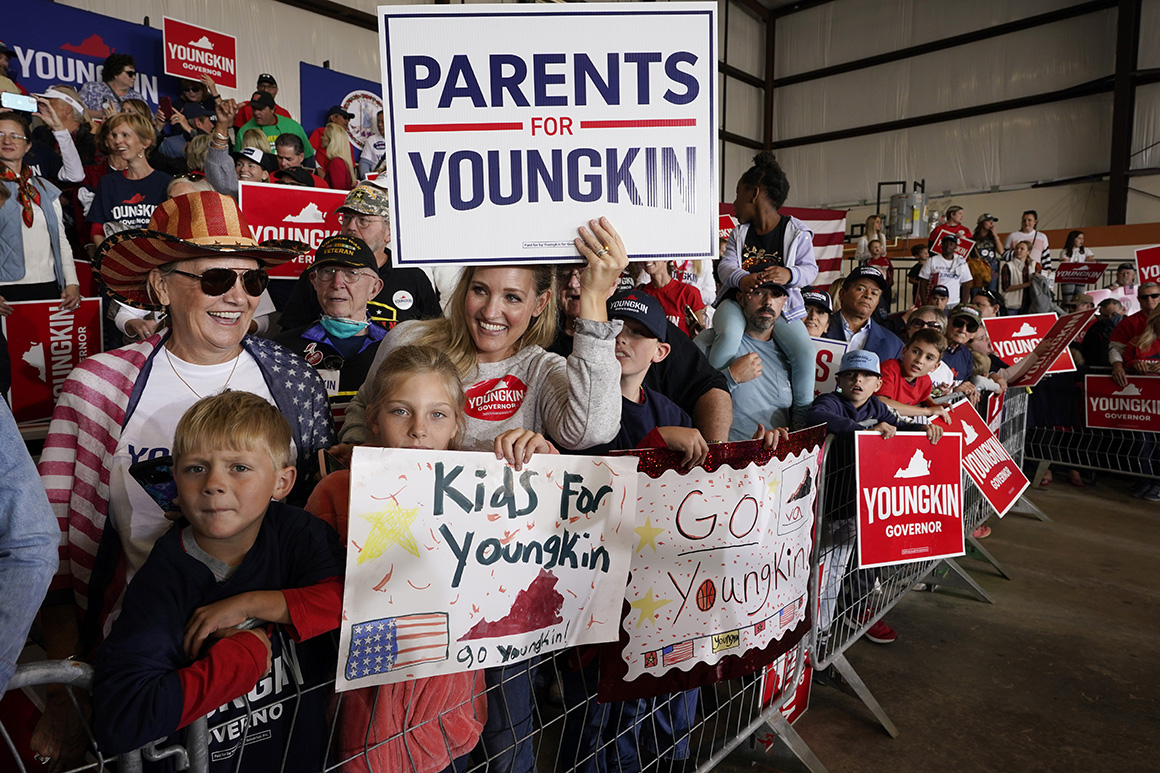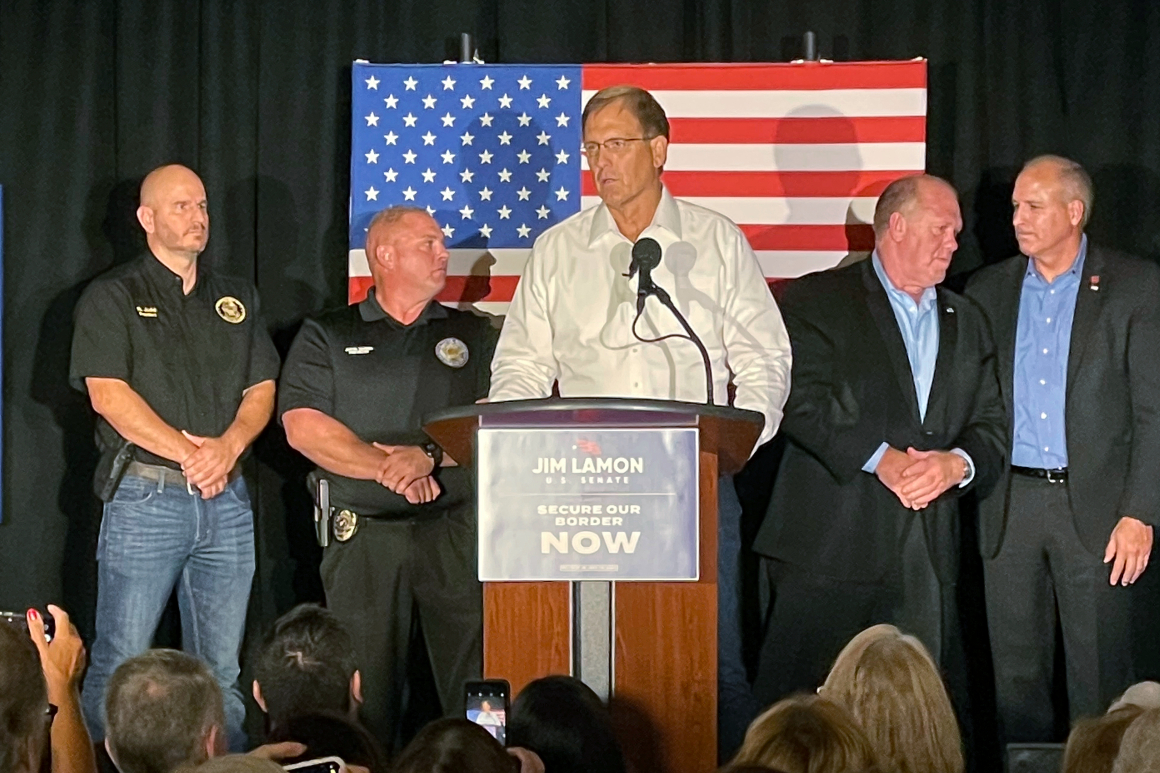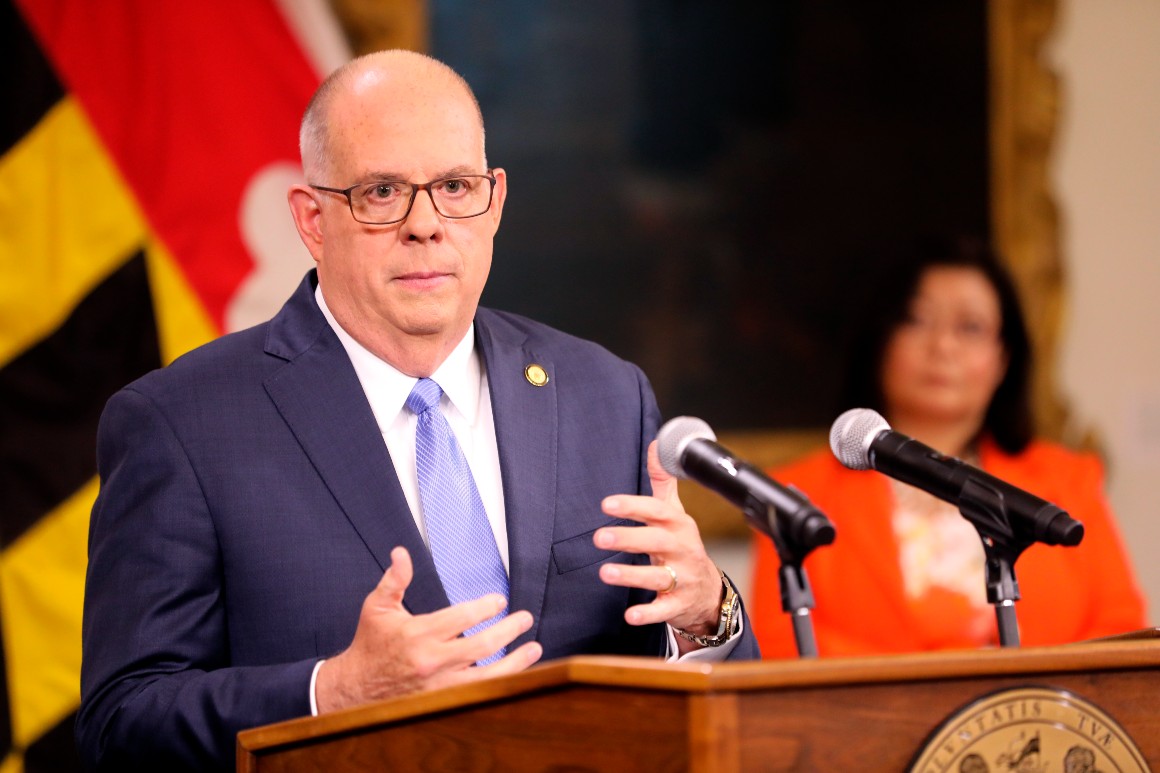
Democrats go into the midterm election with one advantage — a favorable map that gives some reason to think the party can hold its miniscule Senate majority next year.
But it’s not going to be enough on its own to save them in the current political environment.
Not after what Tuesday’s election results revealed. Double-digit swings toward the GOP in races in Virginia and New Jersey last week suggest the seats Democrats narrowly won in recent special elections in Georgia and Arizona will prove difficult to defend, and the Senate playing field could be expanded by the addition of one or more top-tier GOP challengers.
While the 2022 map overall tilts slightly in their favor — sparing the party from defending Senate seats in any states Donald Trump won last year, and giving Democrats multiple pickup opportunities thanks to retiring Republicans — historic midterm trends are working against the party. So is President Joe Biden’s tanking approval rating.
With just one year to go until the midterms — and with Republicans in need of a net pickup of just one seat to take control of the evenly divided chamber — the Democratic Senate majority is far more precarious than at the beginning of Biden’s term.
“Environments like this don’t come around every day,” said Josh Holmes, the former chief of staff to Mitch McConnell, now the Senate minority leader. Holmes continues to serve as his campaign consultant. “If you’re a Republican who’s running for office this year, you’ve picked the right year.”
A successful test case in the Virginia gubernatorial race is the catalyst behind rising GOP optimism. GOP nominee Glenn Youngkin proved a statewide Republican candidate can simultaneously energize Trump’s base and win over the independents and suburban voters that deserted the party under the Trump presidency. The Youngkin playbook suggested Republicans could put together a winning blue-state coalition — while keeping the former president at a distance.

Republicans are also poring over the election data in New Jersey — where incumbent Democratic Gov. Phil Murphy barely held on to win 51 percent to 48 percent in a state where Biden romped a year earlier. Prior to last week’s results, internal Republican polling already showed that suburban voters in swing states were trending away from Democrats this year, and that winning messages included tying inflation to excessive government spending and emphasizing the need to ban school lessons on “critical race theory.”
The National Republican Senatorial Committee had excluded New Jersey from their recent nationwide polling of “suburban battlegrounds,” having automatically removed states where Biden received 56 percent or more of the vote.
Now, there appears to be an opportunity for the GOP to seize on discontentment with Biden in states he won that Republicans, prior to last week, weren’t banking on.
“You’re seeing things like the state Senate president in New Jersey lose to a guy who spent $150 on his campaign,” said Jack Pandol of the Senate Leadership Fund, a super PAC aligned with McConnell. “That’s when you perk up and take notice.”
A poll in Colorado just released by a Democratic strategy firm showed Biden underwater in the state — his approval falling from 55 to 45 percent in the last four months — though more voters in Colorado continue to identify as Democrats than Republicans.
On election night last week, the Senate campaign of Colorado Republican Eli Bremer, a former Olympic athlete and first-time candidate, put out a memo outlining his and Colorado’s similarities to Youngkin and Virginia. The campaign noted that Youngkin decided to “avoid taking the bait from [Terry] McAuliffe on Trump,” instead focusing on “issues that were driving the swing vote,” a strategy they suggest will be effective in Colorado.
Pandol pointed to Colorado as an example of a state Republicans should begin to look at seriously as a Senate pickup opportunity. Democratic Sen. Michael Bennet, who is up for reelection in 2022, has seen his favorability drop from 46 percent in June to 40 percent last month, according to the Global Strategy Group poll, which was conducted for the liberal nonprofit group ProgressNow Colorado.
Yet Republicans have significant exposure of their own — most notably a cast of frontrunning candidates with flaws big enough to blow up their campaigns.
Some of them are already facing attacks for domestic and sexual abuse scandals, candidates such as Sean Parnell in Pennsylvania, whose estranged wife claims he assaulted her and their children; former Gov. Eric Greitens in Missouri, who allegedly sexually assaulted his hairdresser and resigned from office mid-term; and Herschel Walker in Georgia, the retired football star whose ex-wife says he threatened to shoot and kill her.
“The thing that is looming is ‘are we going to f--- up recruitment?’” asked one Republican Senate strategist, describing multiple current GOP frontrunners as “ne’er-do-wells.”
“Maybe it’s so crazy post-Trump that Eric Greitens will win, but that’s the concern — that we have it, it’s sitting right there, but we have totally unelectable people.”
It wouldn’t be the first time. Republicans found themselves in a similar situation in 2010, when the GOP took back the House two years after Obama’s presidential election, but failed to secure a Senate majority.
In that midterm, Republicans were hampered in swing states by tea party-backed Senate candidates such as Ken Buck in Colorado and Christine O’Donnell in Delaware, who beat out once-popular establishment Republicans in the primary, only to lose in November. In Nevada that year, the conditions were ripe for Republicans to defeat Democratic Senate Majority Leader Harry Reid — who was unpopular at the time — but they blew it after nominating right-wing candidate Sharron Angle.
While Youngkin’s success involved appealing to voters who preferred Biden over Trump last fall, that exercise in needle-threading is going to be much harder for Republican candidates elsewhere to do when they are forced to go full-fledged MAGA to win their crowded primaries.
“Republicans want to pretend, ‘We found our answer — it’s Glenn Youngkin,’” said Matt Canter, a Democratic pollster who previously worked for the Democratic Senatorial Campaign Committee. “Well, a lot of the field of Senate candidates in most of these states don’t look anything like Glenn Youngkin. I think that’s going to be a huge obstacle for them.”
The GOP will also have to contend with intraparty mudslinging and attacks by conservative super PACs that have already defined multiple Republican primaries this cycle, including those in Pennsylvania, North Carolina, Ohio, Missouri and Arizona.
Trump’s hesitation to endorse in the latter three has Republican candidates in those states scrambling to demonstrate loyalty to the former president. And that’s not the only factor shaping GOP primaries, for better and for worse: Across the country, deep-pocketed Republican Senate hopefuls are making it known they’re willing to put in tens of millions of dollars of their own money in order to win.

Arizona Republican Jim Lamon told a gathering of GOP women last month he planned to put a staggering $50 million of his own money into his Senate race, according to a video of the event obtained by POLITICO. So far, Lamon — who shares a campaign consultant with Youngkin — has loaned his campaign $5 million.
“This is going to be a $100 million campaign,” said Lamon, whose vote share currently registers in the single digits. “I am going to personally fund half of it.”
In Ohio, multiple Republican candidates launched their primary fights with millions of dollars of their own money: Mike Gibbons loaned his campaign $7.9 million, Bernie Moreno $3 million and Jane Timken $2 million.
In general, the NRSC has a significant cash advantage over the DSCC. Monthly FEC filings show the Republican committee with $27.7 million cash on hand, compared to the Democratic committee’s $13.4 million. But Democrats continue to excel in grassroots digital fundraising efforts — among them Rep. Val Demings, who raised $8.4 million in the third quarter in her bid against GOP Sen. Marco Rubio in Florida.
Some top Republican recruits are still deciding what to do, including several current governors in blue or swing states. New Hampshire Gov. Chris Sununu is expected to announce a decision on running for Senate as soon as this week, as polling shows him ahead of incumbent Democratic Sen. Maggie Hassan.
If Republican Gov. Doug Ducey enters the Arizona Senate race, he’d be a threat to capture some of the moderate vote from incumbent Democratic Sen. Mark Kelly, who is otherwise poised to be up against one of several Trump diehards in the current field.

And Gov. Larry Hogan in Maryland, a popular Republican in a solidly blue state, could put the state in play for Senate Republicans if he decides to jump in. Hogan said he hasn’t ruled out a Senate run, though advisers believe he has no imminent plans to do so, despite recruitment efforts increasing in the past week.
Still, the fight for control of a chamber currently split 50-50 is likely to come down to a small universe of competitive contests in Pennsylvania, Georgia, Arizona, Nevada, North Carolina, Wisconsin and New Hampshire — all states where, apart from New Hampshire, presidential election margins last year were narrow.
The challenge for Democrats in 2022 is to put the focus on Republican positions such as fighting for tax breaks for the wealthy, protecting the rights of anti-vaxxers and refusing to accept the outcome of fair elections, Canter said, allocating resources to make voters view the races as a clear choice between the candidates on the ballot — not just a vote against current Democratic rule.
“If it’s referenda on Democrats, if it’s one side defending itself and the other side going on the attack, we’re going to lose,” said Canter, the Democratic pollster.
Despite the grim outcome in the off-year elections last week, many Democrats aren’t convinced it’s a harbinger of what’s to come in 2022. While Democratic victories in Virginia in 2017 were a bellwether of the party’s sweeping midterm gains the following year — including wresting back control of the House — that blue wave missed the Senate in 2018.
“I’m just struck by the fact in 2019, Democrats won a governor’s race in Kentucky and reelection in Louisiana, and I don’t think Republicans in that moment believed it to be manifest destiny,” said JB Poersch, president of Democrats’ Senate Majority PAC, the main super PAC devoted to winning Senate seats. “And I’m not sure there’s anything about Virginia or about Tuesday night that’s manifest destiny too.”
The most vulnerable incumbent Democrats on the ballot this year are already battle-tested, said Justin Barasky, a Democratic strategist and former longtime DSCC staffer who served as a senior adviser to the committee last cycle.
Two Democrats who will appear on the ballot in battleground states next year, Sens. Raphael Warnock in Georgia and Kelly in Arizona, each just finished hard-fought campaigns in the past year — Warnock in a runoff in January and Kelly in a special election last November.
And two other vulnerable Democratic incumbents, Sen. Catherine Cortez Masto in Nevada and Hassan in New Hampshire, faced tight races when they were elected to the Senate in 2016. The four incumbents are outraising their current Republican challengers.
“They’re ready for whatever comes at them,” Barasky said.
----------------------------------------
By: Natalie Allison
Title: The Democratic Senate majority was already dicey. Then came Virginia.
Sourced From: www.politico.com/news/2021/11/08/democratic-senate-majority-dicey-virginia-520214
Published Date: Mon, 08 Nov 2021 04:30:01 EST
Did you miss our previous article...
https://consumernewsnetwork.com/politics-us/veterans-plead-for-medical-marijuana-but-the-va-rejects-cannabis-research






